Apocalyptic Special
Ragnarök Is Coming Exploration Stories By Tegedao
IMPACT WINTER:
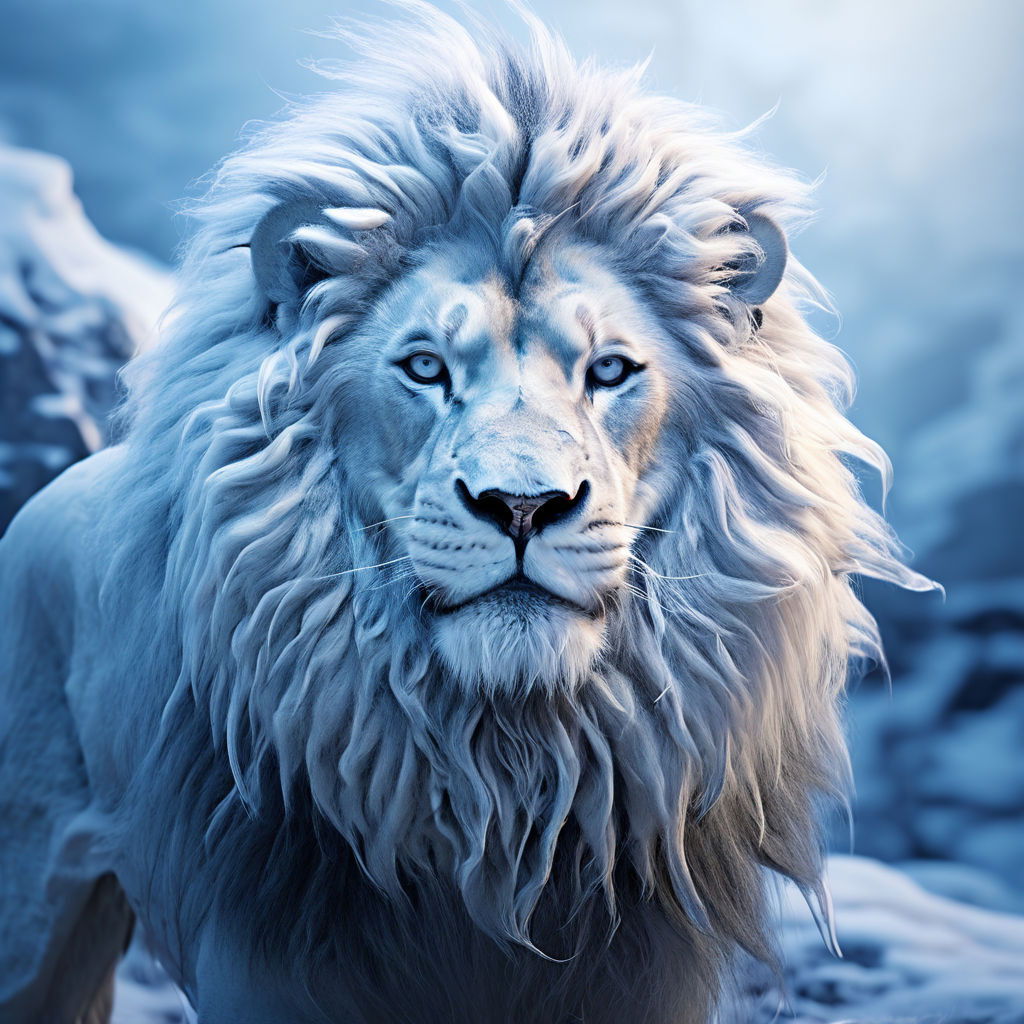
Prologue:
In the distant reaches of a future not far beyond the horizon, the year 2068 marks a turning point for humanity, a culmination of our celestial vulnerability. Apophis, a colossal asteroid 10 kilometers across, descended from the void, targeting Earth with indifferent precision. It crashed into the wilderness of Kejimak National Park in Canada—not a direct hit on any bustling city, but its impact was nevertheless civilization-shattering.
For centuries, astronomers had scanned the skies, tracking bodies that streaked across the cosmos. Yet, despite their advanced technology and vigilant eyes, this was one disaster they could not avert. NASA's efforts to redirect the monstrous rock proved futile. Apophis struck with the force of hundreds of thousands of atomic bombs, a harsh reminder of nature's indomitable power.
This catastrophic event birthed what came to be known as the 'Impact Winter.' The asteroid's collision hurled vast quantities of dust, ash, and debris into the atmosphere, cloaking the planet in darkness and plummeting global temperatures. The sun, once the sustainer of all life, became a distant, obscured memory. Earth's surface transformed rapidly; what had been temperate zones turned into frigid deserts, and ecosystems crumbled.
The most profound silence of extinction loomed over the planet, mirroring the fate of the dinosaurs millions of years ago. It seemed that the Earth was destined to follow a cycle of creation and destruction, and humanity was merely a fleeting chapter in its voluminous saga.
Yet, life—stubborn and resilient—found a way to persist. Amidst this frozen apocalypse, a man named Ndonsa Lungelo emerged from the altered landscapes of Nigeria's savannah, now a barren snowfield. The savannah's inhabitants had adapted in strange, evolutionary leaps; elephants had grown woolly like the ancient mammoths, zebras had shed their stripes, and lions boasted thick coats that bristled against the cold wind. Many species vanished, but others endured, morphed by the harsh new world.
Ndonsa, a middle-aged man who had witnessed the world’s drastic alteration, chose isolation over despair. He lived alone, a solitary figure against the vast white wilderness, relying on the minimal resources that survived the cold snap. His existence was a daily testament to human resilience and adaptability.
But the quiet, icy years following the impact were merely the calm before another storm. In 2080, twelve years after Apophis’s descent, the sky brightened unexpectedly—not with the return of the sun, but with the arrival of a spaceship. It descended through the winter clouds with a grace that belied its otherworldly origins, landing softly near Ndonsa’s humble shelter.
Out stepped Captain Alecx Colbix, an otherworldly figure clad in a sci-fi uniform sparkling with interstellar dust. He belonged to the Yeti-space monkeys, a species from the distant exoplanet Leonis Pircium. The captain had come with an unimaginable announcement and a pivotal choice for Ndonsa, the sole survivor of the Impact Winter Earth. Their encounter was not just a meeting between man and alien but a bridge between past calamities and future possibilities.
Thus begins the saga of Earth’s last survivor and his journey beyond the stars, a narrative of loss, discovery, and the unyielding spirit of humanity. Ndonsa’s story is not merely one of survival, but of the rebirth of a race and the endless quest for new worlds in the cosmos’s vast, mysterious expanse.
--
Chapter 1: The Day the Sky Fell
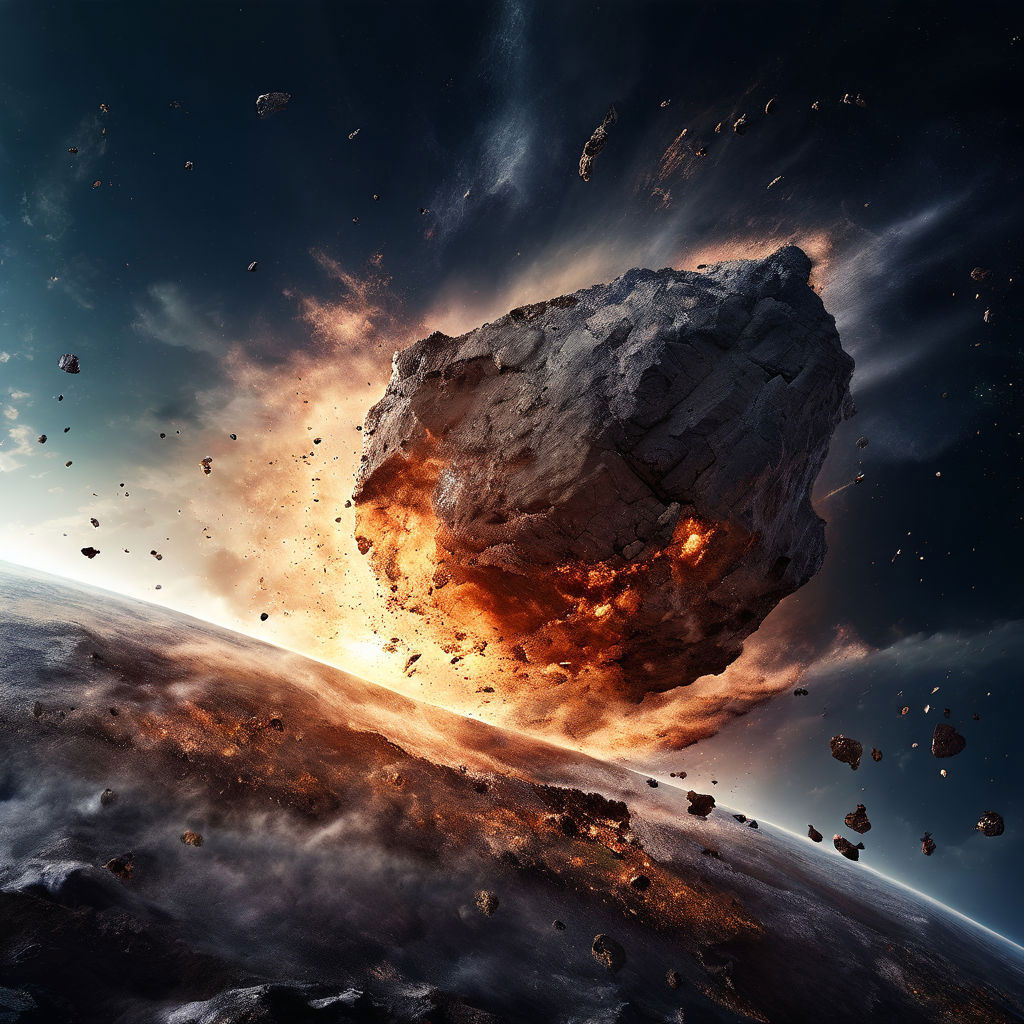
The year 2068 had dawned like any other, but as January ebbed, a palpable tension gripped the world. Families huddled around screens, watching endless streams of news updates. Scientists had calculated the trajectory of Apophis with unnerving precision—the 10-kilometer-wide asteroid was on a collision course with Earth. Governments issued preparations and safety guidelines, but in many hearts, there was a silent acknowledgment that little could be done to avert the looming catastrophe.
In Nigeria, Ndonsa Lungelo stood outside his modest home on the savannah, eyes fixed on the sky. The air was abuzz with the distant hum of panic, media outlets broadcasting across all frequencies, but Ndonsa felt a strange calm. He was a man who had always lived by the whims of nature, and now, as a potential global ending approached, he found a resigned peace in accepting the inevitable.
It happened on a Thursday afternoon. The sky, which had been a clear blue canvas, suddenly darkened as if smeared by the ash of a thousand extinguished fires. A deep rumble echoed through the atmosphere, a sound so profound and terrifying it seemed as though the earth itself groaned in despair.
When Apophis struck, it did so with the fury of an ancient god. The impact site was thousands of miles away in the remote wilderness of Canada's Kejimak National Park, but the effects were instantaneous and global. The ground shook violently, tossing Ndonsa to the dirt as birds scattered into a frenzied, shrieking ballet above.
The heavens roared, and a colossal plume of dust and ash began its ascent into the stratosphere, spreading out to form a thick, suffocating blanket over the planet. Within hours, the temperature began to drop as the sun’s rays were blotted out.
The initial global panic transitioned into a grim acceptance. Emergency broadcasts switched from prevention strategies to survival tips. Governments mobilized, but with infrastructure crippled and communications faltering, their efforts were chaotic at best.
In the cities, the lights flickered and died as power grids collapsed under the strain of the new, harsh environment. Looting and despair swept through the streets like the bitter winds that now circled the globe.
In his remote corner of the savannah, Ndonsa watched the world change before his eyes. The grasslands, once rich and verdant, began to frost over, a white sheen slowly creeping across the land like a silent death. The animals, too bewildered to comprehend the sudden shift, huddled together for warmth or migrated in confused masses to nowhere.
Days turned into weeks. The dust in the atmosphere settled somewhat, but the sun remained a dim, distant memory, its warmth and light smothered by the lingering ash. Temperatures plummeted, and what had once been a bustling ecosystem was now a quiet, frozen tableau.
Ndonsa adapted quickly. He had always been resourceful, a trait that now served him well. He fashioned clothing from the furs of animals that had succumbed to the cold, built a sturdy shelter, and stockpiled whatever food he could gather and hunt. He became a specter in a ghostly landscape, moving silently through the frost-covered grass, a lone figure against the endless white.
As the first month of the impact winter drew to a close, Ndonsa settled into his new life. The world had changed irrevocably, and he with it. Every day was a battle for survival, but he was determined to persevere, to hold on to the sliver of hope that life, in some form, would continue. The savannah was now a realm of ice, and Ndonsa, its solitary king, ruled over the quiet and the cold, waiting for the day when the sun might break through the gloom.
The day the sky fell had brought an end, but in that end was also a beginning—of resilience, of adaptation, and of an unexpected future that lay hidden beneath the frost and the quiet despair.
Chapter 2: A New Ice Age
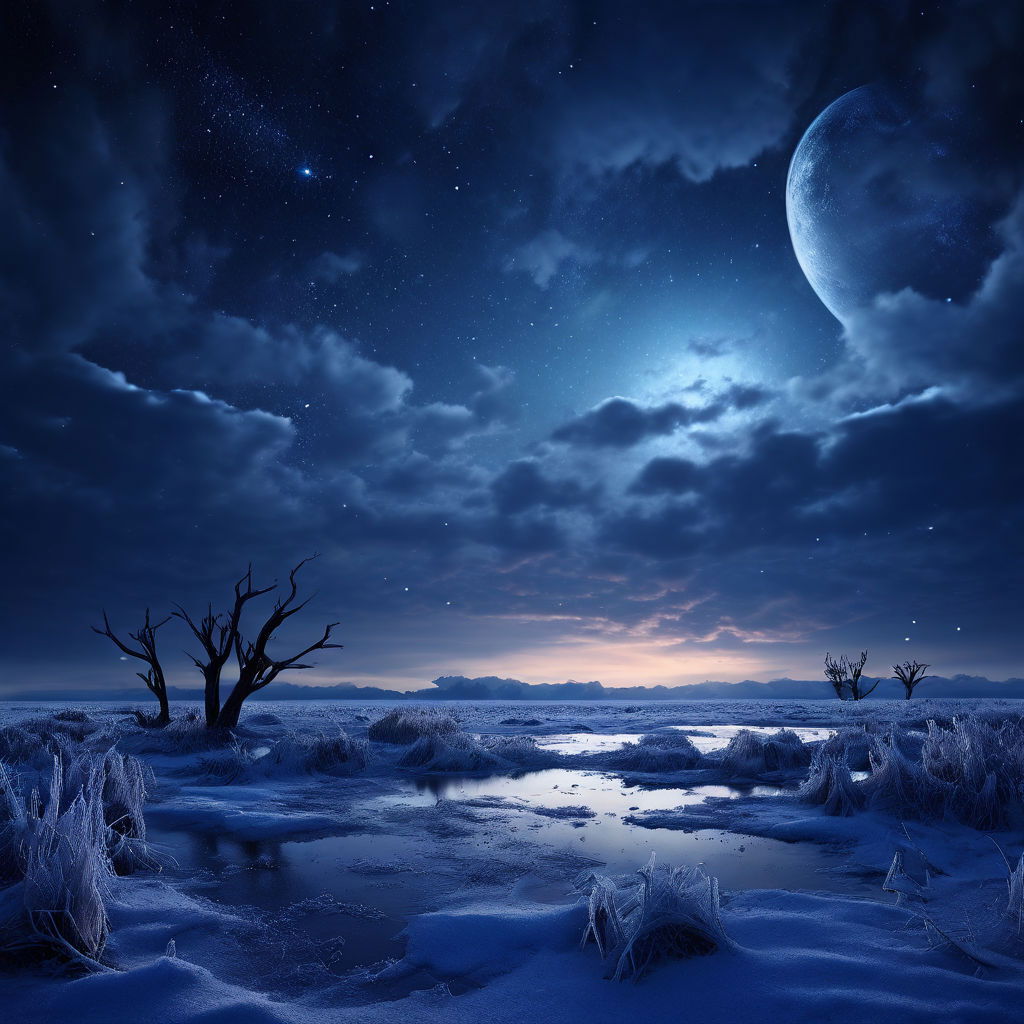
Months turned into years, and the landscape that Ndonsa once knew as the warm, vibrant savannah was now a perpetual ice field. The dramatic drop in temperature had transformed the surface of the Earth into a near-arctic environment, even in regions that once boasted sweltering heat. In this new ice age, the sun was a rare sight, often just a brighter smudge behind a thick veil of cloud and ash.
Ndonsa had become a figure sculpted by the cold, his features hardened and his movements deliberate. His hut, built from the salvaged wood of withered trees and insulated with animal hides, stood alone in a clearing that was once a buzzing marketplace of animal activity. Now, his days were marked by the routines necessary for survival: checking his crude traps, gathering frozen roots, and occasionally venturing to a nearby frozen river to chip away ice for water.
Inside, the hut was sparse but functional. A small fire pit in the center provided warmth and a means to cook the scant provisions he managed to gather. The walls were adorned with simple tools and weapons crafted from the bones and remnants of the animals that had once populated the savannah. Despite the desolation outside, Ndonsa maintained a meticulous order within his dwelling, a small semblance of control in a world that had slipped into chaos.
The flora and fauna had undergone startling transformations. Trees bore leaves that shimmered with a silvery sheen, reflecting any available light to maximize photosynthesis in the dim world. Animals had evolved quickly; elephants now sported thick, woolly coats, their trunks lined with extra fat to prevent freezing. Predators like lions had grown long, dense fur, adapting to become silent stalkers in the snow rather than the golden hunters of the grasslands.
One day, while checking his traps, Ndonsa stumbled upon a sight that stopped him cold—a herd of zebras, their stripes faded to near invisibility, their bodies bulkier and their fur thick to combat the unyielding frost. It was both wondrous and heart-wrenching to witness such familiar creatures so altered by nature's ruthless hand.
Despite the stark survivalist existence, signs of a slow recovery began to emerge. The thickness of the ash clouds seemed to be lessening, allowing for moments when the sun's rays felt perceptibly stronger. During these brief periods, Ndonsa would stand outside, his face tilted upwards, soaking in the feeble warmth, allowing himself to dream of spring—a spring that might never come but one he hoped for nonetheless.
One such day brought with it an unexpected event. As Ndonsa was out on an extended foray to collect firewood, the quiet of the ice-laden trees was broken by a sudden thrumming noise. Curious and cautious, he followed the sound and found, to his astonishment, a small cluster of bees, alive and buzzing around a crack in a frozen tree where sap was slowly oozing out. It was a minor miracle—a sign that life was not only enduring but also adapting, finding ways to survive even in this frigid desolation.
Despite these small tokens of hope, the isolation weighed heavily on Ndonsa. He had not seen another human, nor heard another voice besides his own, since the day of the impact. His conversations were with the wind, his debates with the stars. His own thoughts echoed back at him, a constant reminder of his solitude.
However, Ndonsa was not one to surrender to despair. He had a vision, born from the deepest reserves of his endurance—a vision of surviving long enough to witness the rebirth of the world, to see the ice melt and the green shoots of new life break through the frozen soil. With each passing day, he fortified his spirit with this vision, crafting from his loneliness a shield against the desolate silence.
And then, one evening, as the twilight merged with the dark clouds, a new light appeared, piercing the sky with an intensity he had not seen in years. It wasn't the sun—it was something else, something otherworldly. As he watched, the light grew brighter, descending toward the earth with a purposeful grace. Ndonsa felt a mix of fear and awe, but above all, a resurgence of hope. Perhaps he was not as alone in this new world as he had thought.
Chapter 3: Contact
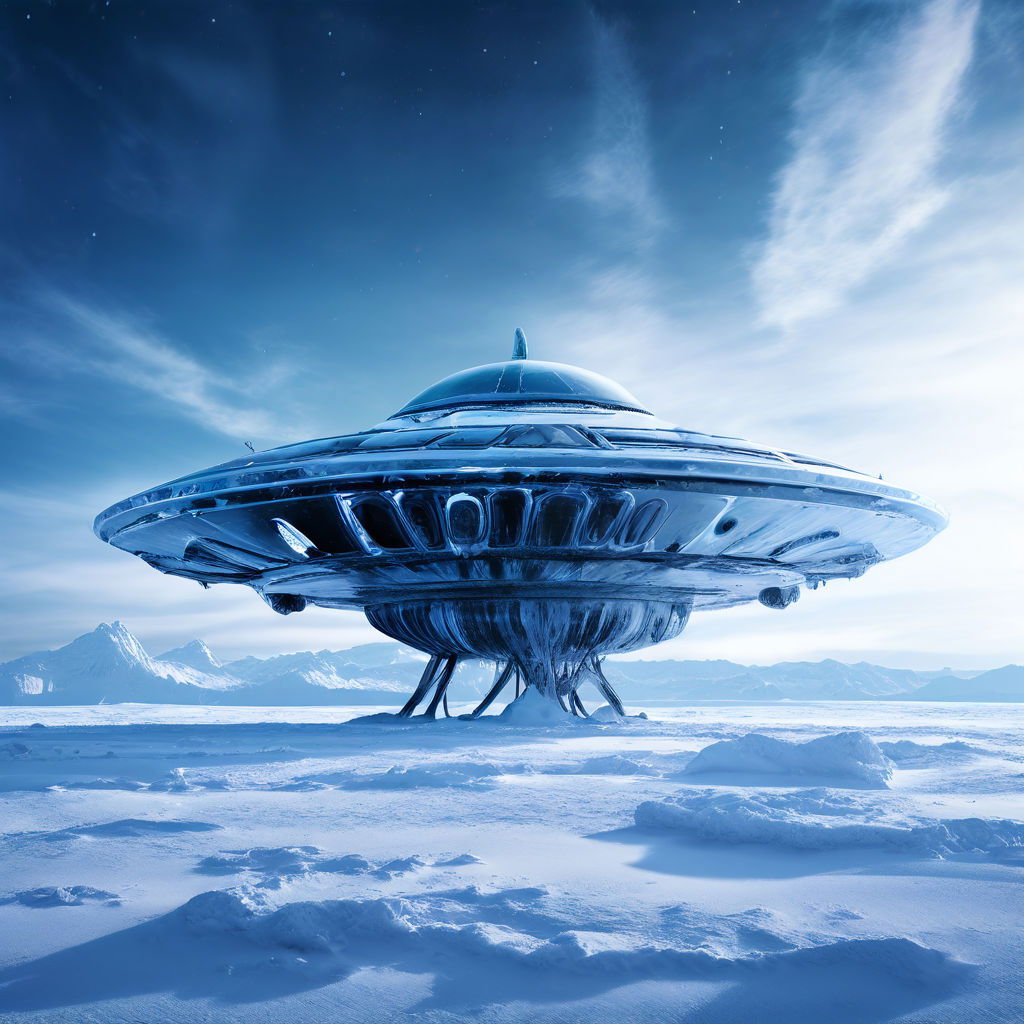
The eerie calm of the twilight was shattered by the descent of the unknown light, its brilliance cutting through the perpetual gloom of the impact winter. Ndonsa watched, his heart pounding with a mix of dread and anticipation, as the light approached the ground near his isolated shelter. It was not the sun’s return but something far more extraordinary—an alien spacecraft, sleek and humming with a quiet power as it settled onto the icy savannah.
The ship’s doors opened with a hiss of escaping air, revealing a figure that stepped out into the frigid air. The creature was tall and covered in shimmering fabric that reflected the weak light, making it appear almost ethereal. As it approached, Ndonsa could see that it was humanoid but distinctly non-human, its features a blend of the familiar and the bizarre.
“Greetings,” the figure spoke in a clear, melodious voice that carried effortlessly through the cold air. “I am Captain Alecx Colbix, of the Yeti-space monkeys, from the Prometheus Galaxy Base.”
Ndonsa, stunned into silence, managed to find his voice. “I am Ndonsa Lungelo, the last of Earth’s children, as it seems. What brings you to this frozen world?”
Captain Colbix explained that his species had been monitoring Earth for some time, aware of the potential for catastrophic events due to celestial threats. The Yeti-space monkeys had developed technologies that allowed them to travel across galaxies and assist other species in surviving and adapting to drastic environmental changes.
“We have come to offer you a chance, Ndonsa,” Captain Colbix continued, his eyes kind yet piercing. “Your resilience and survival skills have made you a prime candidate for our program. We wish to take you from Earth, to help colonize new worlds where humanity can thrive again.”
Ndonsa listened, a whirlwind of emotions coursing through him. The offer was staggering—leaving Earth, his home, even in its ruined state, was something he had never imagined. But the loneliness of his existence weighed heavily on him, and the promise of new horizons stirred a long-dormant hope within his chest.
“Are there others?” Ndonsa asked, a flicker of hope in his voice. “Others who have survived?”
Captain Colbix shook his head gently. “You are the last we have found. The impact winter has been... thorough.”
After a night of deep contemplation, Ndonsa accepted Captain Colbix’s offer. The prospect of carrying forward the legacy of humanity, to be the seed of Earth’s children in new worlds, was a call to adventure he could not deny. As dawn broke, casting a pale light over the frozen landscape, Ndonsa packed the few possessions that meant anything to him and stepped towards the spacecraft.
As the spaceship lifted off, Ndonsa looked down at the shrinking expanse of ice and snow, the only world he had known now slipping away beneath him. His heart was heavy with the loss of his planet, but also filled with an uncharted hope. In his soul, he carried the memories of Earth, the lessons of survival, and a quiet prayer for the future.
The journey through space was a revelation, each star and nebula a testament to the vast, beautiful complexity of the cosmos. Captain Colbix and his crew treated Ndonsa with kindness and respect, sharing their knowledge and preparing him for the life ahead.
As they approached their destination, a vibrant planet rich with life and possibilities, Ndonsa felt a profound connection to his new beginning. He was ready to be the ancestor of a new chapter of human history, bridging the gap between what was lost and what was yet to be discovered.
As the ship descended towards the lush, green planet that would become his new home, Ndonsa Lungelo, the last man of Earth, prepared to step forward into his role as a pioneer. Behind him lay the desolation of impact winter; ahead, the promise of rebirth and endless possibilities.
With a deep breath, Ndonsa stepped out of the spacecraft, his eyes wide with wonder and determination. Here, in this new world, he would plant the seeds of Earth’s legacy, ensuring that the spirit of humanity would endure, evolve, and flourish among the stars.
--
ALONE IN AUSTRALIA:
Prologue:
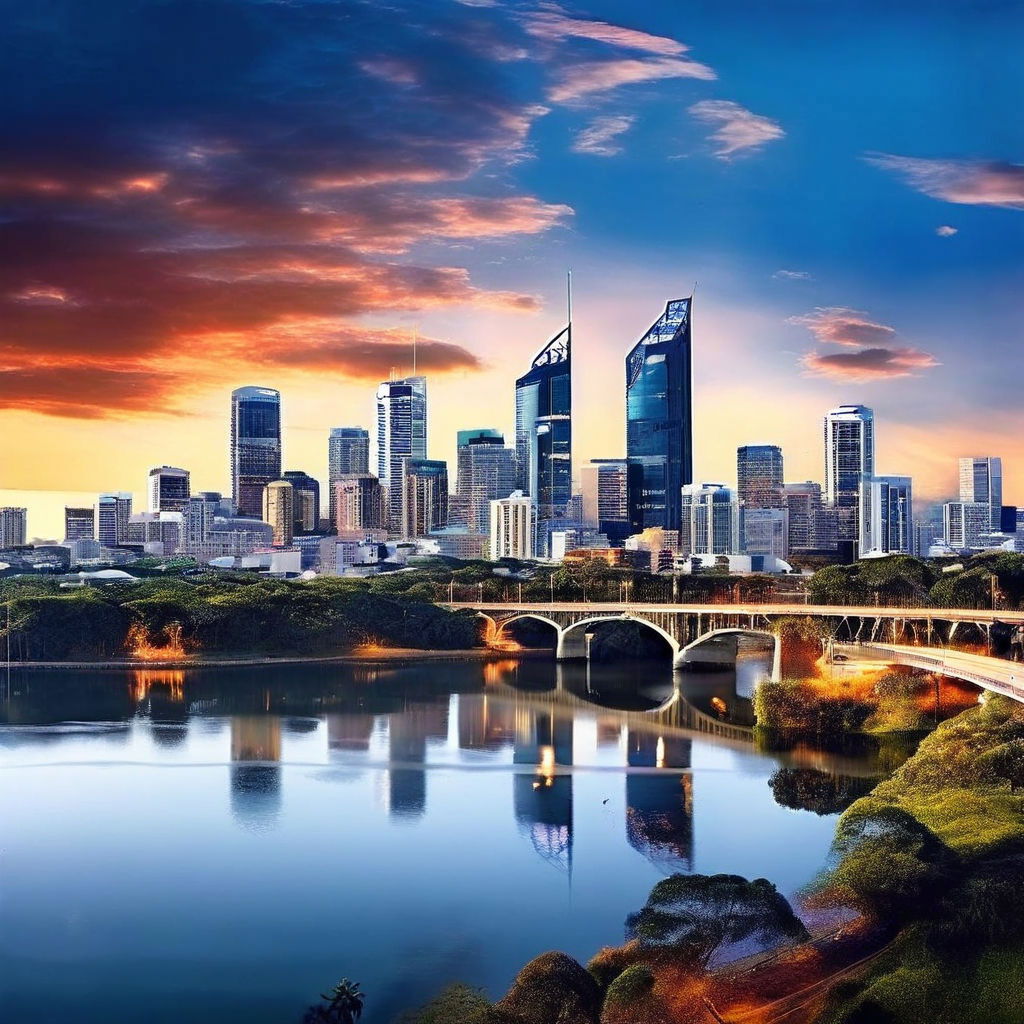
In the presumed aftermath of the world's end—a scenario devoid of zombies, radioactive beasts, or other horrors—our tale unfolds in tranquility and solitude for Vyctor Dariux, a teenager who may well be the last human alive on Earth. He dwells in a desolate yet peaceful Brisbane, Australia, one of the country’s oldest cities, steeped in thousands of years of Aboriginal history.
On New Year's Day 2012, Vyctor, navigating the quiet streets on his bicycle, begins piecing together the enigma of the apocalypse. The morning found him alone, his family vanished, mirroring the emptiness that had enveloped Brisbane’s avenues. Yet, the climate remains unchanged; the year before everyone disappeared, the city enjoyed 283 days of brilliant sunshine. Once teeming with 2.5 million souls, now it seems Brisbane shelters only Vyctor and his bike.
As he pedals through the city, once hailed as the ‘hippest city’ by the Lonely Planet Australia Travel Guide, Vyctor muses, “Is it like this across all of Australia?” His journey takes him through Fortitude Valley, a vibrant hub usually pulsing with life and music, now eerily silent except for his lone voice echoing off the empty buildings. “Australia’s coolest city, even in the apocalypse,” he shouts into the void.
Seeking solace and a break from his solitude, Vyctor heads to Woorim Beach on Bribie Island. The beach is deserted, no surfers in sight—just Vyctor and the waves, until a dark shadow beneath the waters reveals itself as a large tiger shark, drawn perhaps by the silhouette of his surfboard. He muses, as he evades its presence, “Is a tiger shark to be the end of the last man on Earth?” Thankfully, the shark retreats, and Vyctor is left alone once more, pondering his next move.
Hunger strikes, and Vyctor longs for Brisbane’s famed Sand Crab Lasagne from Viale Canova, a dish swimming in white wine sauce he has no idea how to cook. Instead, he makes his way to the St Lucia Supermarket to stock up on sushi, a simpler choice requiring no preparation. As he satisfies his hunger, he contemplates his next steps—perhaps a journey into the Australian bush, a land that, unlike the city, might still teem with life.
Thus begins Vyctor’s quest across the Australian landscape, from the vibrant coral of the Great Barrier Reef to the stark beauty of the Simpson Desert, and on to the mystical pink waters of Lake Hillier. With each pedal and step, he delves deeper into the mystery of the empty world around him, driven by a spirit of adventure and a hope that somewhere out there, he might find a sign, a clue, or perhaps even other survivors.
Could the Aboriginal Dreamtime hold the answers, or is Vyctor truly the last human left to witness the wonders of a world paused in time?
Chapter 1: The Quiet City

Vyctor Dariux woke to the soft murmur of wind weaving through the eucalyptus trees outside his bedroom window—a sound that used to be drowned out by the morning bustle of Brisbane. It was New Year's Day, 2012, but the fireworks and festive cheers were memories from another lifetime. Now, the world held its breath in silence, the city empty, his family gone.
Pushing back the covers, Vyctor felt the cool brush of air against his skin. He dressed quickly, pulling on a hoodie and jeans, his movements mechanical. The routine of breakfast was solitary and silent, marked only by the soft clink of spoon against bowl as he ate his cereal without appetite.
Stepping outside, the air was crisp, hinting at another year of sun-drenched days ahead. Vyctor unlocked his bicycle from the garage—a bright blue fixie with a white racing stripe—and set out into the streets of Brisbane. The quiet was unnerving; the familiar paths and roads devoid of the usual throng of commuters, school children, and bustling cafés. Even the birds seemed muted, their morning songs reduced to faint whispers.
As he cycled, Vyctor passed landmarks that once teemed with life. Queen Street Mall was hauntingly vacant, shop windows displaying last year's fashions, untouched and fading. The Brisbane River flowed quietly beside him, its surface unbroken by ferries or rowers. Over the Goodwill Bridge, he pedaled harder, the rhythm of his cycling a temporary escape from the eerie stillness.
Reaching Fortitude Valley, he expected some remnants of last night's celebrations, but found only silence. The clubs and bars, usually spilling over with music and laughter, stood deserted. "Australia’s coolest city, even in the apocalypse," he muttered to himself, the irony bitter on his tongue.
Vyctor stopped at New Farm Park, the Brisbane skyline stretching out in the distance, unobstructed by the usual haze of activity. He dismounted, walking his bike along the river paths, the grass underfoot sprinkled with dew. This was a place of countless picnics and laughter, echoes of which seemed to hang in the air, just out of reach.
As he sat on a bench overlooking the river, Vyctor pulled out a notepad from his backpack. It was time to jot down what he remembered, to trace the sequence of events leading up to the disappearance. His last clear memory was of his family preparing for the New Year's Eve party, their home bustling with excitement. After that, only fragments remained—a countdown, cheers, a sudden, overwhelming dizziness, and then waking up to solitude.
Determined, Vyctor cycled back to the city center, this time to the State Library of Queensland. If any answers were to be found, they would be here, among the archived newspapers and digital records. He parked his bike and climbed the steps, his footsteps echoing in the empty marble foyer.
Inside, the library was as deserted as the streets. Vyctor logged onto one of the public computers, his fingers tapping rhythmically as he searched for news articles, scientific reports, anything that might explain the sudden vanishing of Brisbane's population. Hours passed, the screen's glow the only light as the sun set outside.
As night fell, Vyctor found himself no closer to answers, the mystery as dense and impenetrable as the darkness outside. Frustrated and weary, he made his way back through the ghostly city, the stars above unusually bright, as if to make up for the extinguished lights of the world below.
Reaching his empty home, Vyctor locked up his bike and went inside. The quiet was overwhelming, but he was not ready to give in to despair. Tomorrow, he would venture further, beyond the city limits, into the natural world that continued to thrive in the absence of humans. Maybe there, in the wild, he would find some clue, some sign of what had happened to everyone else.
For now, he could only watch the stars from his backyard, the cool grass beneath him and the night sky vast and open, a blanket of possibilities yet to be uncovered.
Chapter 2: The Call of the Wild

Vyctor Dariux woke before dawn, determined to leave the oppressive silence of the city behind. Today, he would head to the natural sanctuaries of Queensland, where the land stretched wild and untouched. If the city offered no clues, perhaps the more remote areas would reveal something—anything—that could explain the sudden disappearance of humanity.
After a quick breakfast of granola bars and an apple, Vyctor packed his backpack with essentials: a water bottle, a compact first aid kit, a flashlight, and a map of the surrounding areas. He strapped on his helmet, mounted his bicycle, and pedaled towards the gateway of the greater wilderness—the Glass House Mountains.
The ride was long and strenuous, but Vyctor relished the physical challenge. It grounded him, the burn in his muscles a stark contrast to the eerie ease of the empty city. As he rode through small towns and past abandoned farms, the first signs of life began to emerge. Birds called loudly from the treetops, kangaroos glanced up from their grazing to watch him pass, and a family of emus trotted alongside the road for a few paces before veering back into the bush.
Reaching the base of Mount Ngungun, Vyctor locked his bike to a signpost and began the ascent on foot. The path was steep, winding through dense bushland that thrived in the absence of human interference. The air was fresh, filled with the scents of eucalyptus and wildflowers. Climbing higher, he could see the outline of the Sunshine Coast in the distance, the ocean a brilliant blue.
From the summit, Vyctor surveyed the vast expanse of green below. It was a world that seemed completely unaware of humanity's plight. A gentle breeze rustled the leaves around him, and for a moment, Vyctor felt a part of something larger than himself, a world that continued regardless of human concerns.
Descending the mountain, Vyctor decided his next destination would be the beaches of Noosa. Perhaps the ocean, with its timeless ebb and flow, held some answers. He rode north, the coastal winds growing stronger as he approached the sea.
Arriving at Noosa Heads, the beach was as beautiful as he remembered—white sand, clear turquoise waters, and not a soul in sight. Vyctor stashed his bike in the brush and walked down to the water’s edge. The surf rolled in gently, and he couldn't resist the call. Stripping down to his shorts, he plunged into the waves, swimming out past the breakers where the water calmed and he could float, looking up at the clear sky.
It was here, floating in the embrace of the ocean, that Vyctor felt a sudden rush of freedom and an overwhelming sense of smallness. The vastness of the sea seemed to mock his quest for answers, yet it also soothed his troubled thoughts.
After the swim, as he sat drying off on the beach, a dark shape in the water caught his attention—a large tiger shark, its sleek form cutting through the water with ease. Vyctor's heart raced as he watched it circle, an unspoken understanding passing between them. The shark was not a threat, merely another creature going about its existence, unaffected by the absence of humans. It was a reminder of nature's indifference to human concerns.
Feeling a renewed sense of purpose, Vyctor continued his journey, now heading towards the interior. The Australian bush called to him, its mysteries and wildness promising new insights. He spent the next days exploring the forests and cliffs of the Hinterlands, encountering wildlife that seemed more curious than wary of him.
One evening, as he camped under the stars near the Blackall Range, Vyctor heard the distinct call of a dingo. It was close, perhaps just beyond the circle of light cast by his campfire. He didn't feel fear, only a profound connection to the wildness around him. As he listened to the echoes of the dingo’s calls, Vyctor knew he was not alone in this world, not truly. The land was alive, and he was a part of it, at least for now.
Resolved to push further into the mysteries of nature, Vyctor fell asleep to the sounds of the bush—nocturnal birds calling, the rustle of leaves, and the distant howl of dingoes. Here, in the wild, he found not the answers he sought, but the strength to keep searching.
Chapter 3: Mysteries Unveiled
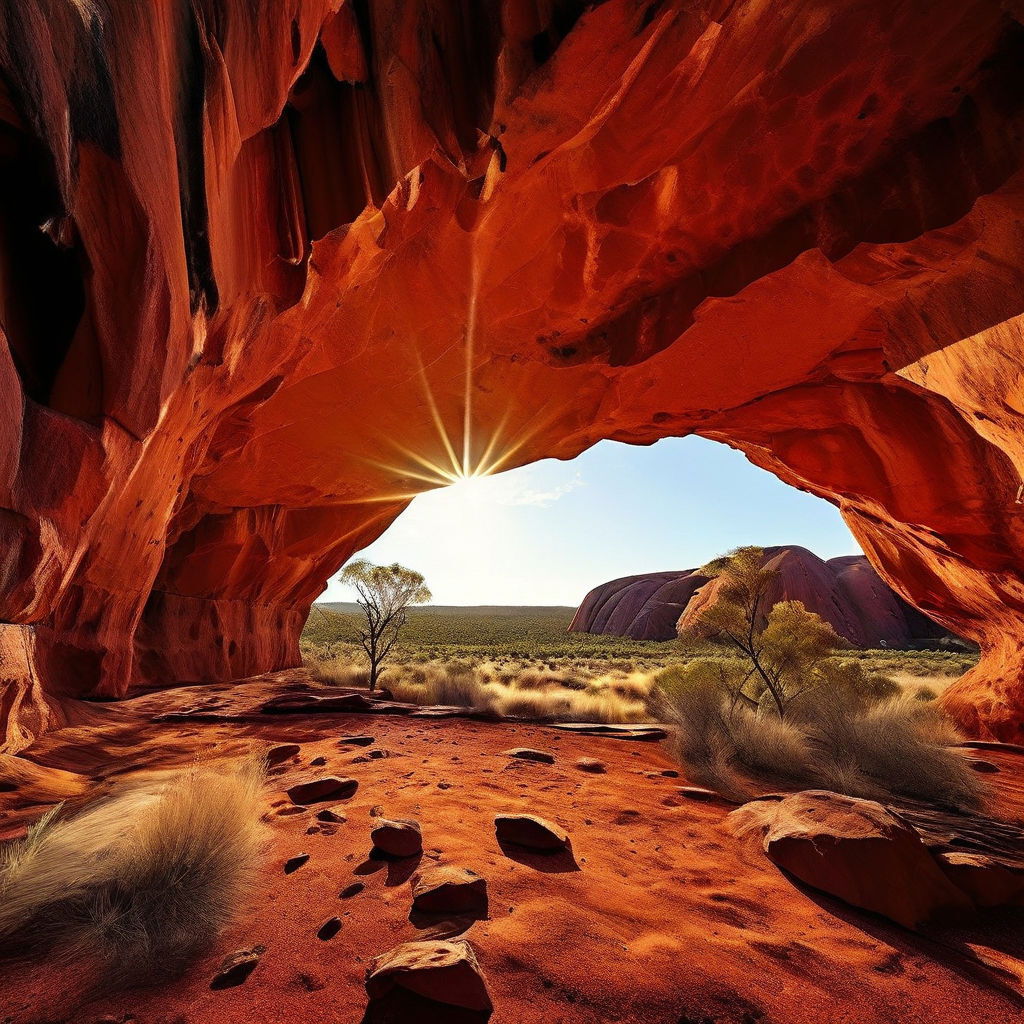
Vyctor Dariux woke to the soft glow of dawn filtering through the trees. Today, he felt a pull towards the spiritual heritage of the land, a path that might offer some resolution to the empty world around him. Deciding to delve deeper into Aboriginal mythology and the concept of Dreamtime, he believed these ancient stories might hold keys to understanding—or at least coping with—the current inexplicable reality.
After packing up his camp in the Hinterlands, Vyctor set his sights on the Daintree Rainforest, a place rich in biodiversity and steeped in Aboriginal heritage. As he cycled closer, the air grew heavy with moisture, and the lush greenery enveloped him in an almost mystical embrace. The rainforest was alive with the sounds of birds and insects, a stark contrast to the silence he had grown accustomed to.
Upon arriving, Vyctor met with an Aboriginal guide (Dreamtime vision), who agreed to take him on a walk through the forest, explaining the significance of the land and its creatures in the Dreamtime stories. The guide spoke of the Rainbow Serpent, creator of rivers and mountains, and how it shaped the very landscape they walked upon. Vyctor listened, captivated, his earlier feelings of isolation melting away with each story woven into the fabric of the forest around him.
That night, under a canopy of stars, Vyctor experienced his first vivid dream. He saw the Rainbow Serpent gliding through the land, its body carving out riverbeds and shaping valleys. The dream was so real, so tactile, that he awoke with a sense of having touched something ancient and profound.
Emboldened by his dream, Vyctor continued to explore the spiritual aspects of the landscape. He traveled next to Uluru, the massive sandstone monolith in the heart of the Northern Territory. Known for its spiritual significance, Uluru was a place of great power and mystery in Aboriginal culture. As he stood before the imposing red rock, Vyctor felt a deep connection to the earth and its history.
There, Vyctor spent days walking around Uluru, each sunset and sunrise painting the rock with shifting shades of red and orange. It was during one of these quiet moments, sitting against the cool stone, that Vyctor had a second dream. This time, he met an Aboriginal elder in the Dreamtime, who spoke of the cycles of life and the land's resilience. The elder explained that just as the land endures through cycles of drought and flood, so too must humanity adapt and survive through its own challenges.
The message was clear: Vyctor was not to find the reason for humanity's disappearance but to understand his role in the ongoing cycle of the world. He was a keeper of memories, a witness to the solitude and beauty of a world paused.
With a newfound sense of purpose, Vyctor decided his final destination would be the Great Barrier Reef. If there were any signs of human or supernatural intervention, he hoped to find them among the coral's ancient and vibrant ecosystem. Arriving at the coast, he donned snorkeling gear and plunged into the water. The reef was alive with color and life—corals, fish, and marine creatures thriving in a world apart from human woes.
As he explored the underwater paradise, Vyctor found a peculiar formation in the coral, a natural archway that seemed almost deliberately shaped. Swimming through it felt like passing into another world—a world where the boundary between reality and myth blurred.
Emerging from the water, Vyctor knew what he had to do. He would return to Brisbane, not to continue his solitary existence, but to document his journey and the lessons learned from the land and its ancient cultures. Perhaps, one day, if humanity returned, his records would serve as a bridge between the past and a future where people lived in harmony with the earth.
Vyctor's journey had started with an ending, but it concluded with the understanding that endings are also beginnings. With a heart full of stories and a spirit enriched by the land, Vyctor set off towards home, ready to face whatever lay ahead, guided by the stars and the enduring wisdom of Dreamtime.
--
Prologue: The Zone

In the year 2006, a second, catastrophic event unfolded at the Chernobyl Nuclear Power Plant. This mysterious disaster further exacerbated the desolation of the already infamous Chernobyl Exclusion Zone. Rendered even more inhospitable and reclaimed by a rampant wilderness, the area transformed into an eerie, untouched landscape known simply as "The Zone."
As word of this altered reality spread, The Zone began to draw adventurers from across the globe, each drawn by tales of its perilous allure and hidden treasures. This influx gave rise to the phenomenon known as the S.T.A.L.K.E.R.s: part explorer, part mercenary, part treasure hunter. These brave and often foolhardy souls ventured into The Zone, driven by the promise of discovering what lay beyond the ordinary.
Amidst the overgrown urban decay and the lurking dangers of mutated flora and fauna, these individuals sought out the legendary heart of The Zone, rumored to be a place called the Oasis—a potential source of untainted, radiation-free water.
Among them was Bortsov Pavlovich, a seasoned S.T.A.L.K.E.R. with a unique belief that The Zone was not merely an accident, but a gift to humanity, meant to be shared and explored. His journey led him deep into The Zone, where he encountered the dangers and wonders of this haunted landscape.
Bortsov’s quest centered around a peculiar underground tunnel that promised passage to the enigmatic core of The Zone and possibly to the Oasis itself. As he ventured further, he found himself at a forbidding barrier warning of experiments beyond—conducted by top Soviet scientists.
Ignoring the warnings, Bortsov climbed over the fence into The Zone proper. What he discovered was beyond imagination: a ghost town of gray, abandoned concrete buildings, overtaken by greenery as far as the eye could see.
As Bortsov delved deeper into the mysteries of The Zone, he encountered both the terrifying and the wondrous. Mutant creatures roamed the landscapes, including the massive, mutated Chernobyl dogs and the invisible Poltergeists haunting the deeper recesses of abandoned buildings. But more daunting than the creatures were the supernatural phenomena that seemed to bend the very laws of physics, suggesting that The Zone was more than just a place—it was an entity, shifting and alive.
"The Zone is a site of an alternative reality version of the Chernobyl Power Plant after a second explosion that polluted the surrounding area with radiation," Bortsov pondered. "This place is a ghost town with paranormal elements!"
Each step took Bortsov closer to uncovering the truth behind The Zone’s existence. Was it merely a geographical anomaly, or something more profound? As he approached the dark heart of this forsaken place, the line between reality and nightmare blurred, setting the stage for a journey that would challenge the very essence of what it meant to be human.
In the shadows of this apocalyptic wilderness, Bortsov and his fellow S.T.A.L.K.E.R.s would discover that The Zone, with all its horrors and mysteries, was not only a place to fear but also a place that might hold the key to understanding the new, terrifying frontier of human existence. And as Bortsov took his first steps into this haunted landscape, he knew that his journey—to become a true S.T.A.L.K.E.R.—was just beginning.
--
The Zone: A Tale of Bortsov Pavlovich (FAN FICTION)
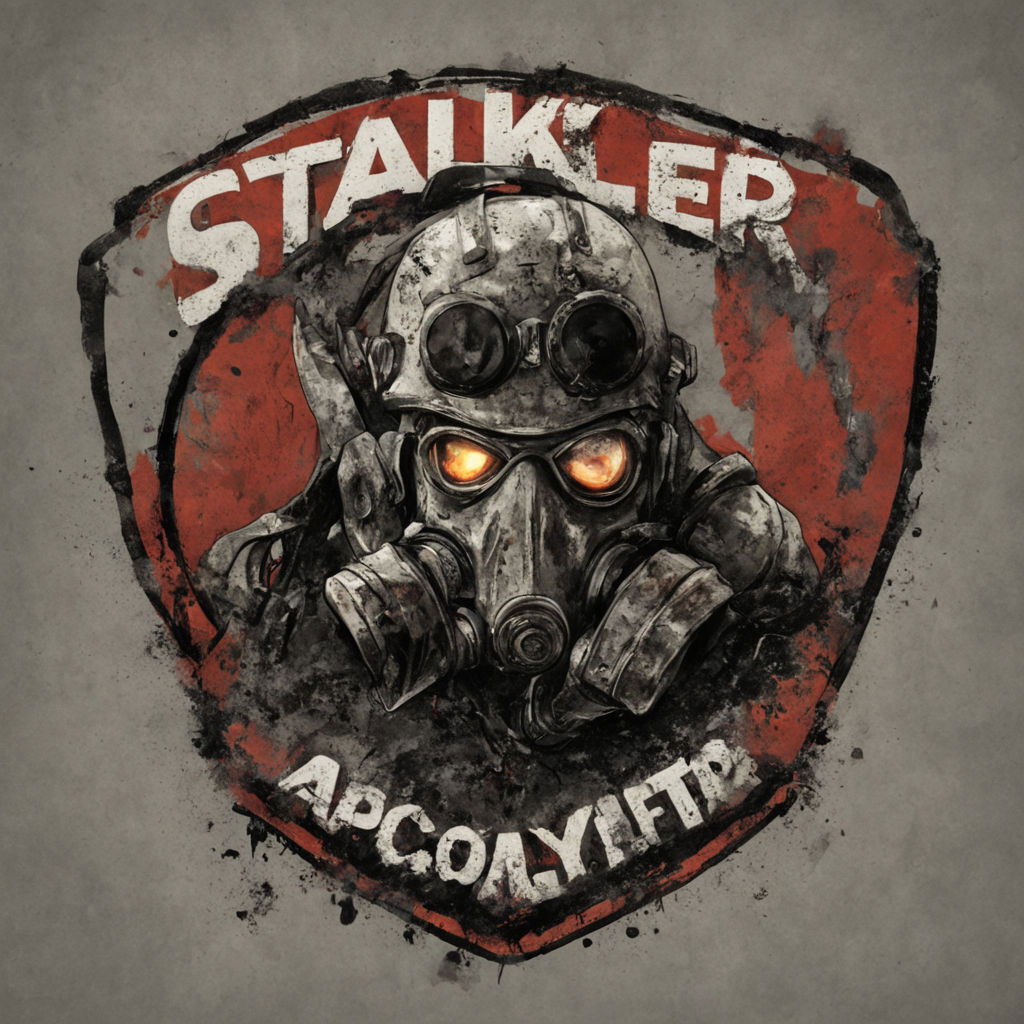
In the vast wilderness that now consumed what once was the Chernobyl Exclusion Zone, now transformed and known only as "The Zone," lay mysteries and dangers that drew the brave, the lost, and the greedy. Among these souls was Bortsov Pavlovich, a seasoned S.T.A.L.K.E.R., a scavenger of this radioactive wasteland, driven by legends of an untainted oasis hidden deep within its heart.
The day Bortsov stepped over the threshold into The Zone, the sky was a tapestry of grim clouds, casting an ominous shadow over the land. The once-bustling towns were now silent, held in the grip of nature’s reclaim. Buildings, their structures weakened and decayed, were draped with the lush green of wild foliage, a stark contrast to the invisible threat of radiation that hung in the air like a deadly perfume.
Bortsov's old Geiger counter clicked steadily in his pocket as he navigated through the derelict streets of Pripyat. The sound was a constant reminder of the invisible death that had settled over the land two decades ago. His mission was clear—find the Oasis. Rumored to be a hub of untainted water, it was said to be located somewhere near the heart of The Zone, guarded by anomalies and mutants, remnants of the disastrous second explosion that had rocked the Chernobyl Nuclear Power Plant in 2006.
As he moved deeper, Bortsov encountered other S.T.A.L.K.E.R.s. They were a motley crew: treasure hunters, scientists, and thrill-seekers, each drawn into The Zone by their own reasons. Among them was a young woman named Katya, a biologist, who believed that understanding the mutations within The Zone could unlock new scientific frontiers.
Together, they ventured towards the center, where the radiation was strongest and the landscapes most bizarre. The flora and fauna here were like nothing seen before—trees glowing with an eerie bioluminescence, animals with too many eyes, and shadows that seemed to move of their own accord.
After days of trekking, Bortsov and Katya stumbled upon a partially buried lab entrance, hidden beneath twisted metal and rubble. It was marked with the faded insignia of a forgotten research initiative: The Oasis Project.
Inside, the lab was a time capsule, a snapshot of hurried evacuation. Papers scattered, vials broken, and in the center of the main room, a large, rusted device that hummed with a faint, residual energy.
Katya’s eyes widened as she sifted through the papers. "Bortsov, this isn’t just about water. This—this was an experiment gone terribly wrong. They were trying to create a micro-ecosystem, completely sustainable, unaffected by the external environment. But something happened…"
The papers detailed a series of experiments involving quantum mechanics and radiation, aiming to create a bubble of untainted reality—The Oasis. But the documents hinted at unforeseen results, anomalies that began to affect not just flora and fauna, but the very fabric of reality itself.
Driven by the revelations, they delved deeper into The Zone, towards the so-called heart where the Oasis was rumored to exist. The environment grew increasingly alien, with gravity wells that twisted space, and spectral figures that flickered in and out of existence.
As they approached, a massive anomaly appeared, a swirling vortex of light and shadow that defied physical laws. Bortsov felt a pull, a literal drawing of his being towards the center. With a determined look, he turned to Katya, "We may not get another chance to see what’s truly at the heart."
Hand in hand, they stepped forward, and the world shifted. Suddenly, they were not in The Zone but standing in a lush green field under a bright, clear sky. In the distance, a pristine lake reflected the sun in a dazzling display.
"This is it," Katya whispered, "The Oasis."
But as they explored, they realized that this paradise was isolated from the real world, a pocket universe created by the experiments, unstable and temporary. The realization was bittersweet. The Oasis was real, but it was not a place one could live in, not permanently.
The return to The Zone was jarring. The beauty of the Oasis faded into the gray decay of the nuclear wasteland. With heavy hearts, they made their way back to the boundary, each step away from the Oasis weighing heavily on their spirits.
Back outside, Bortsov recorded the coordinates and sealed the entrance to the lab. "What now?" Katya asked, her face streaked with dirt and exhaustion.
"Now, we tell our story," Bortsov replied, gazing back at the sealed door. "We let the world know about The Oasis, about what can be achieved, and what should never be attempted."
As they left The Zone, the sun set behind them, casting long shadows over the land. The Zone remained, silent and waiting, its secrets buried but restless, a reminder of human folly and ambition, a haunted testament to both the perils and promises of pushing beyond the boundaries of nature.
Bortsov looked back once more, knowing he would return. The Zone, with all its horrors and wonders, was part of him now. And somewhere in its heart lay an impossible Eden, a reminder of what might have been.
Epilogue: Echoes of the Apocalypse
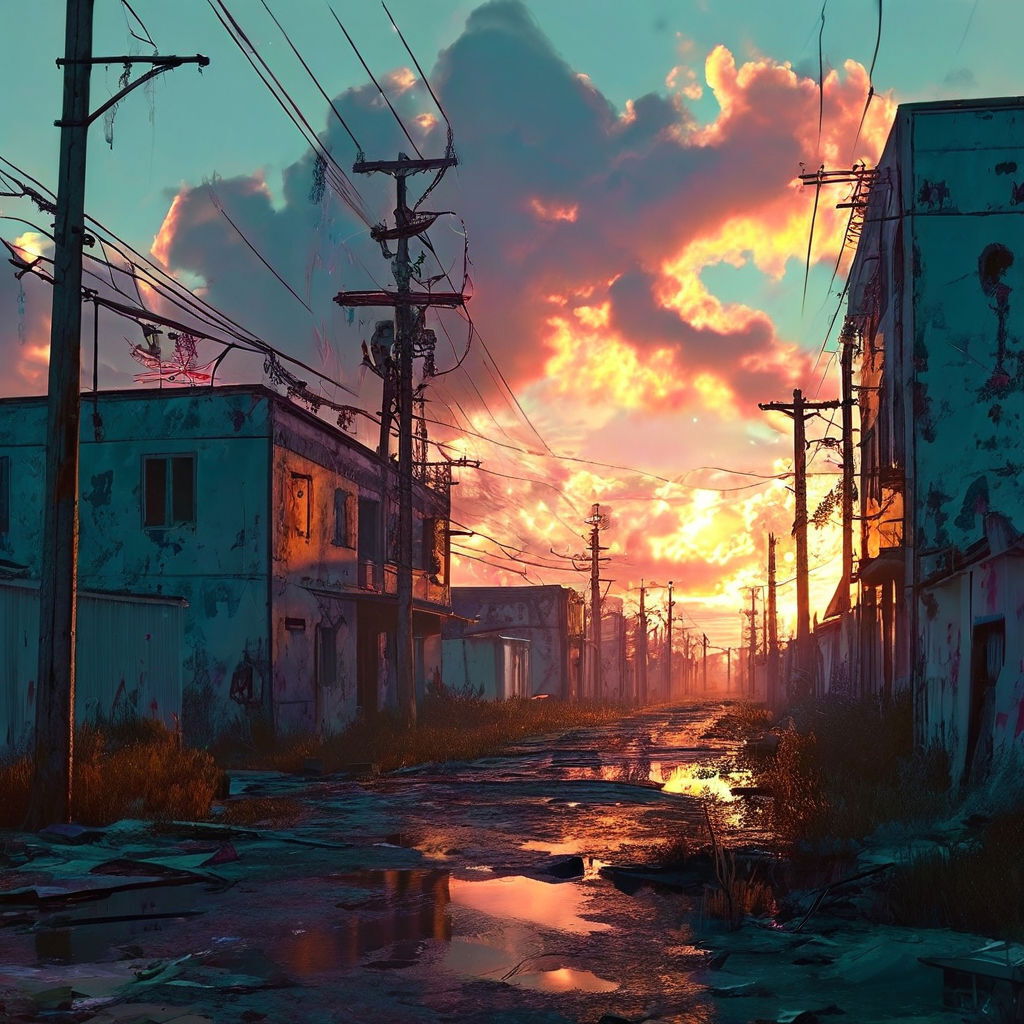
As dusk fell over the once vibrant, now desolate landscape of The Zone, the wilderness seemed to exhale a breath held too long, its heavy sigh laden with the ghosts of the past and the stark realities of its present condition. The Zone stood as a poignant testament to the catastrophic consequences when humanity's reach exceeds its grasp. In its eerie silence and pervasive desolation, it whispered tales of both caution and curiosity.
The Zone, reborn from the ashes of two nuclear disasters, had morphed into an apocalyptic wilderness, a stark and sprawling canvas showcasing the ultimate aftermath of unchecked scientific ambition and environmental neglect. Here, the remnants of civilization were swallowed by the voracious growth of a mutated nature, where flora and fauna had evolved far beyond their natural origins under the sinister caress of radiation.
Buildings, once symbols of human achievement and daily life, now stood as crumbling monuments to hubris, their skeletal frames overrun by the relentless encroachment of twisted vines and mosses, glowing faintly with the bioluminescence of radioactive decay. The very air thrummed with the unseen danger of contamination, a perpetual haze that blurred the line between the hauntingly beautiful and the fatally toxic.
The Zone was not merely a geographic area; it had become a concept, a dramatic warning of the potential endgame of human folly. The anomalies—tears in the very fabric of reality—served as physical manifestations of this new, warped wilderness. These anomalies defied explanation and resisted study, their dangers as real as the radiation that spawned them.
In the nights that held The Zone in its dark embrace, the cries and roars of its mutant inhabitants echoed through the forest, a cacophony of the wild reclaiming its dominion. These creatures, some grotesque parodies of their former selves, others entirely new horrors birthed by the atomic energies unleashed, roamed the landscape. They were the new rulers of this realm, thriving amid the ruins of their predecessors.
Yet, amidst this desolate and chaotic existence, The Zone held a strange beauty, stark and terrifying, but compelling. Its landscapes, altered forever, told stories of resilience and adaptation. It stood as a living laboratory of survival in the face of cataclysm, a place where life, however altered, continued to eke out an existence.
For those few who dared to enter, to explore its depths and uncover its secrets, The Zone offered a glimpse into a possible future where nature and anomaly intertwined in an endless dance of creation and destruction. It was both a tomb and a cradle, a place where the end of one world lingered and the seeds of another waited to sprout.
As Bortsov left The Zone, his last glance back was tinged with a mix of awe and melancholy. The Zone, a once thriving region now a haunting apocalyptic wilderness, served as a stark reminder of the delicate balance between human innovation and the natural world. It was a boundary not just of place, but of time and possibility, a borderland where the echoes of the apocalypse whispered into the winds of a new beginning.
This story is a quintessential apocalyptic tale - The Zone encapsulates the ruinous aftermath of human hubris and the haunting beauty of a post-apocalyptic world.